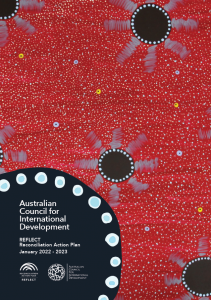ACFID’s Reconciliation Journey

ACFID Secretariat has recently commenced its reconciliation journey and has developed a Reconciliation Action Plan (RAP), which will assist us to further develop respectful relationships and create meaningful opportunities with Aboriginal and Torres Strait Islander peoples.

ACFID Secretariat is guided by Reconciliation Australia’s RAP Framework to develop this inaugural Reconciliation Action Plan, and is inspired by the ACFID Council who passed Resolution No. 1/2017.
ACFID’s commitment to diversity, inclusion and equality are realised through our vision, purpose and values. Aboriginal and Torres Strait Islander rights, recognition and reconciliation are vital to the work of ACFID and its members as we work towards a world free from injustice and inequality.
ACFID and its members stand in solidarity with Aboriginal and Torres Strait Islander peoples for Makarrata – “the coming together after a struggle” – through truth, justice, healing and agreement making, and support the aims and aspirations of Aboriginal and Torres Strait Islander peoples for substantive constitutional reform.
Our support of the Voice
In 2023, ACFID stood in support of the Voice. Further information can be found here.
Reconciliation Action Plan (RAP)
A Reconciliation Action Plan is a strategic document that supports an organisation’s business plan. It includes practical actions that will drive an organisation’s contribution to reconciliation both internally and in the communities in which it operates.
There are four types of RAPs that an organisation can develop: Reflect, Innovate, Stretch, and Elevate. Many organisations complete successive RAPs as their reconciliation journey progresses, and ACFID intends to follow the same path. ACFID will draw reference and inspiration from both members who engage directly with indigenous communities, and our Aboriginal and Torres Strait Islander Community of Practice.
ACFID’s Reflect RAP
ACFID is currently proudly delivering our first Reflect RAP.
The actions within will support us to develop future RAPs that are built on respectful relationships, have a clear vision for reconciliation, and are meaningful, sustainable and mutually beneficial.

ACFID Submission on the Indigenous Voice Discussion Paper
ACFID welcomes the government’s Indigenous Voice co-design report and the work completed to date. We wholeheartedly support a framework that is community designed and led and it is encouraging to see models for both a “Local and Regional Voice” and a “National Voice” emerge. We believe these should always espouse the principles of participation, empowerment, and local ownership. View ACFID’s submission here.
Acknowledgements
ACFID acknowledges the traditional custodians of the lands and waters throughout Australia. We pay our respect to Aboriginal and Torres Strait Islander cultures, and to elders past and present.









